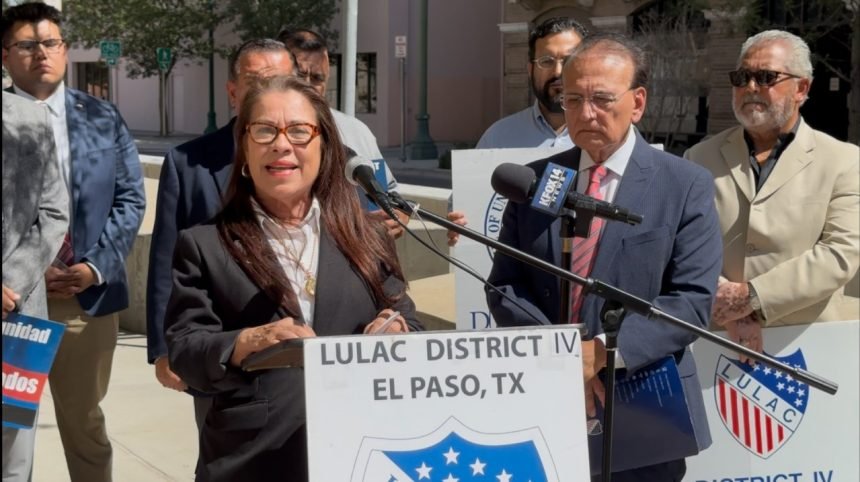League of United Latina American Citizens Deputy Counsel Gloria Leal (left) speaks to reporters outside a federal courthouse in El Paso where judges will determine the legality of new congressional district maps redrawn by the Texas Legislature.
EL PASO, Texas (Border Report) – Hispanics accounted for nearly half of Texas’ population growth in the decade ending 2020 and 2 out of 5 state residents now identify as Hispanic or Latino, according to the U.S. census.
But in the five years that followed the number of Hispanics representing Texas in the U.S. House of Representatives only went from seven to eight, and the state’s mid-decade congressional redistricting threatens to dilute their political representation, activists say.
That’s why two of the most powerful Latino organizations in the country this week are gathered inside a federal courthouse in El Paso where plaintiffs are challenging newly drawn congressional district maps by the Texas Legislature they say are discriminatory.
“What we are talking about on the eighth floor (of the federal courthouse) is a misapplication of the law and unconstitutional,” said Gloria Leal, national deputy counsel for the League of United Latin American Citizens (LULAC). “We believe that in in drawing these maps, the Legislature evidence racial intent to purposely dilute coalition districts.”
The Mexican American Legal Defense and Educational Fund (MALDEF) is joining LULAC in opposing the maps this week in El Paso. Both nonprofits say they are apolitical but have opposed the Trump’s administration’s policies on immigration, education and healthcare funding through litigation or public statements.
The plaintiffs including LULAC allege the maps were drawn to dilute minority voting power and are unlawful.
The State of Texas denies any discriminatory or racially motivated intent behind the maps.
The outcome of the challenge could determine whether President Trump will continue to have a Republican majority in the House and further erode immigrants’ rights and gut education and healthcare funding. Activists allege Trump compelled Texas GOP leaders to draw new maps because he fears the GOP losing the House in the 2026 election.
Leal said the maps directly threaten minority representations in four districts in the Houston area and one in North Texas. The first maps drawn by the Legislature also took Fort Bliss away from the El Paso-centric 16th Congressional District and placed them under the 23rd Congressional District, whose representative lives in San Antonio.
LULAC National Vice President Ray Mancera said the final map leaves the Army post in the 16th Congressional District. But if the three-judge panel hearing the case in El Paso green-lights the Legislature’s map, he expects a “domino effect” in terms of loss of political clout, funding and services for minority communities.
Testimony in the case began this week and will continue through at least next week. The judges on the panel are U.S. District Judge Jeffrey V. Brown, a Trump appointee from Galveston; U.S. District Judge David Guaderrama, an Obama appointee; and U.S. Circuit Judge of the 5th Circuit Court of Appeals Jerry E. Smith.
Leal said the plaintiffs are confident the judges will declare the maps illegal, but are prepared to contest an adverse outcome all the way to the U.S. Supreme Court.
Some elected officials in El Paso said that regardless of the outcome, this is a wake up call for minorities to exercise their right to vote and trump gerrymandering.
“It is a shame this litigation is going on here in El Paso, here in Texas … all because of the Republican leadership more concerned about their jobs than their country and the Constitution. That’s what it comes down to,” said El Paso County Commissioner Sergio Coronado. “This is a critical time in our country. I want to make sure everyone out there feels the urgency to register, make sure you vote in all of the elections that are coming up.”










